

About Us
Lovehandmade.co (LH) is an organization seeking to play its role for the empowerment of rural Sindh’s artisans. We place special emphasis on female home-based workers, as we believe their socio-economic uplift doesn’t just help them and their families, but the entire community.
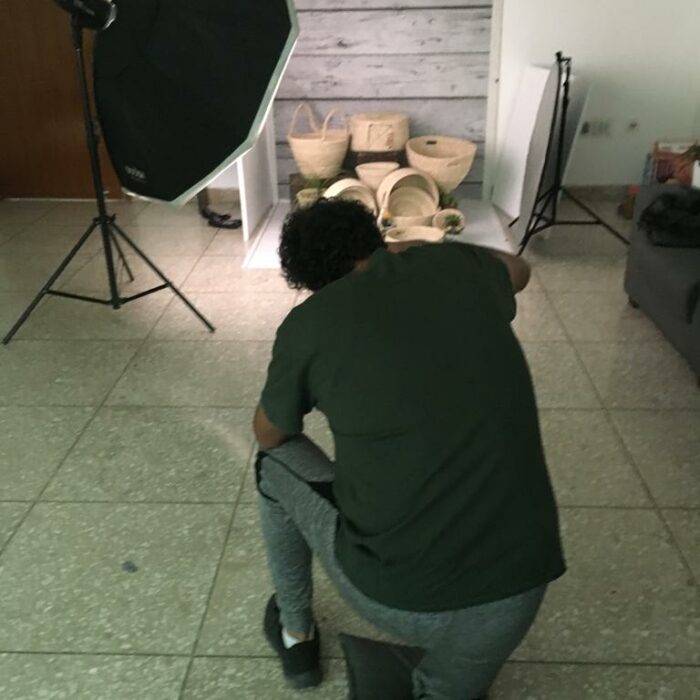
Our experiences, research and interactions with both aspiring and established artisans in the province have shown that focus on the above-mentioned skills can go a long way. LH’s focus is not on improving or modernising local designs. We also aren’t attempting to achieve a temporary boost in income generation through the wholesale purchase of craftwork. Both of these approaches would only give short-term results, failing to bring any sustainable improvements to living standards and social indicators in rural Sindh. Furthermore, the artisanal heritage of the province cannot be considered revived as long as it remains dependent on external intervention by the government, private sector or non-government organisations.
Instead, our initiative aims to impart the much-needed skills mentioned above. We believe that sustainable change can only be bought by expanding local skillsets so they are able to run their own businesses successfully. As mentioned above; this includes the use of modern tools such as chalk and measuring tape, better time and resource management, quality control, the ability to create products with standardised designs and dimensions as well as digital skills.
Our project is led by Zein Ahmed. Zein’s journey with ethical design began in Lahore in the 1990s. In 1998, she shifted to New York City, where she became part of the slow fashion movement and set up her own clothing label, Guru. Her designs were crafted with an urban flair, but employed environmentally conscious production modes. Furthermore, she has always engaged masters of traditional crafts from Pakistan for her work. This includes big names like weaving ustad, Wazir Ali, and ajrak ustad, M. Riaz.
LH believes in working closely with our Business Development Group, monitoring every facet of the production process. Everything from the acquisition of raw materials to pricing is overseen by team members including project lead Zein Ahmed. Before the start of the Pandemic, the team would drive out to the BDGs to meet with LH’s artisans in person, establishing a rapport with them and understanding their preferred methods of work.
LH takes all measures to ensure maximum participation of women artisans in their projects. This requires that steps be taken to facilitate women so they can partake while also observing local cultural norms. For this reason, we have arranged at-home workspaces at many of our BDGs. This has proven extremely advantageous since the COVID-19 pandemic broke out. Furthermore, we also inquire about any tools or equipment artisans would require for their work and provide it to them. This includes equipment needed for the manufacture of products as well as basics like stools and work tables.
Environmental friendliness and sustainability is a major factor for LH when acquiring raw materials. Furthermore, everything should be non-toxic for the safety of artisans. This often requires rejecting the materials preferred by the craftsmen themselves. However, BDG leaders remain with the team for every step of the process, including visiting markets and assessing potential new purchases.
The team places significant stress on quality of work, as this is the only way to ensure our artisans derive long-term benefit from our program. Steps are taken to encourage enthusiasm in this regard, such as arranging friendly competitions. Additionally, we also teach them the skills required to improve them as artisans and make them eligible for employment with major mainstream brands. These include skills like making design sketches before transferring them onto a product, and replacing practices like “hand measuring” with the use of more accurate tools like measuring tape. Tests are also conducted to determine artisans’ level of competency.
Once our products hit the shelves, sales are assessed and customer feedback is collected to determine which products have been successful and what changes buyers would like to see in our lineup. Requests related to design, ergonomics or materials are always taken into account and considered for LH’s next batch of goods.
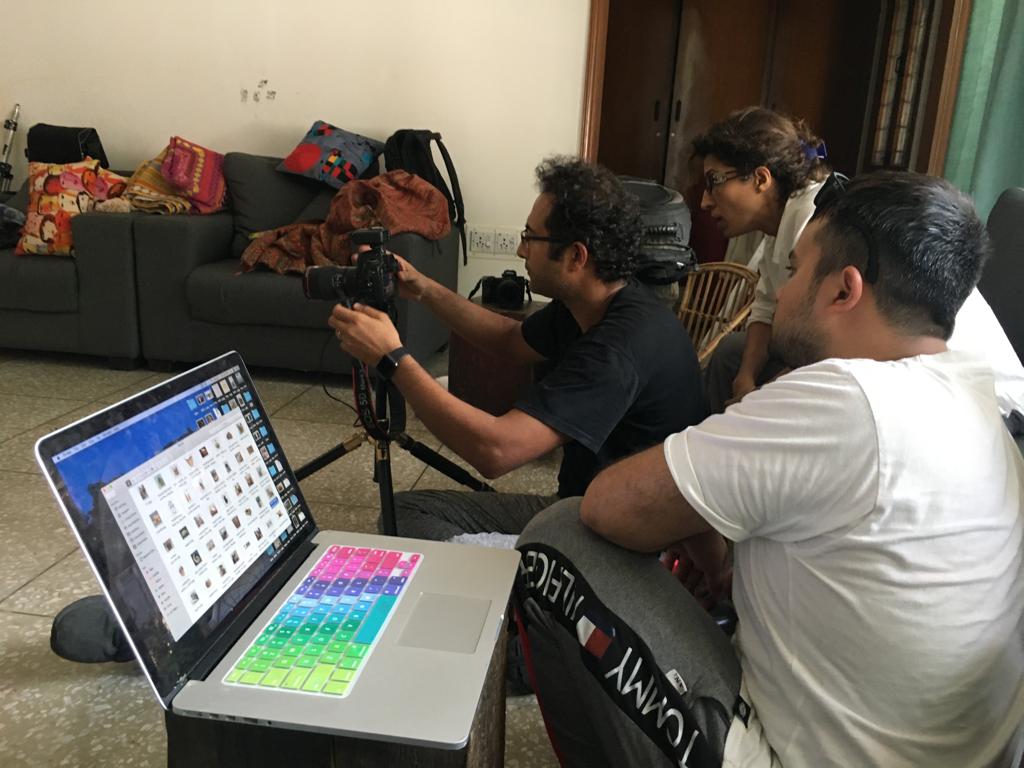
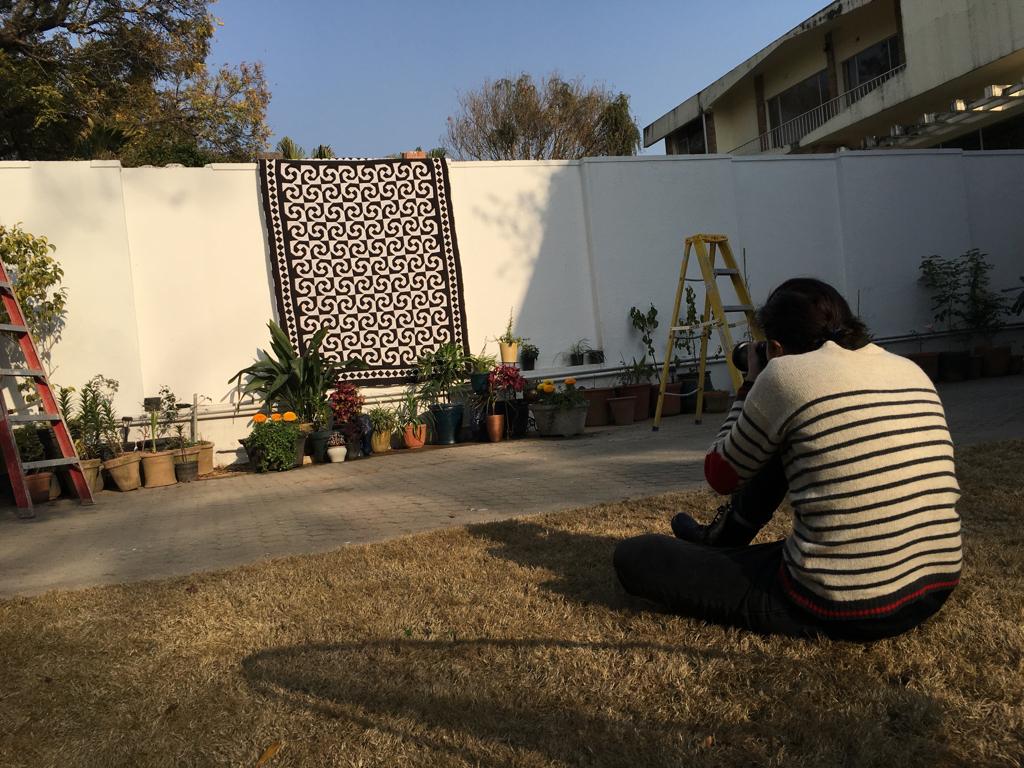
Sindh produces about 0.28 million tonnes of dates annually. But there’s more to the Date Palm than its fruit. Ornamental platters and wide baskets weaved from dried date leaves are one of the province’s most recognisable traditional crafts. Date leaf weaving is an ancient practice, which some partake in to fulfill their own household needs, and others to supplement their income. The skill is passed down from mother to daughter from generation to generation.
The women take strips of dried date leaf, weaving them around each other to create discs that are then folded and expanded into baskets. It’s a tough job, requiring the strips be constantly pulled tense between both hands and one foot.
The Ajrak is synonymous with Sindh’s cultural heritage. These block printed shawls are theorized to date back to the Indus Valley Civilization itself. They display complex geometry created with woodblock stamps. The designs are printed in a combination of white and black on a red field. All dyes are natural vegetable or mineral based.
Centuries after this art form came into being, the Ajrak continues to play its role as a central component of Sindh’s local apparel. The Sindhi people hold the garment in high regard. It is often presented as a gift of hospitality, and is worn at big events such as weddings. In rural areas, the shawl is used to carry babies and set up makeshift swings for children. Men may even wear it as a cummerbund.
One wouldn’t think it when they see it, but the Ralli Quilt is completely made of recycled fabrics, particularly old Ajraks. Layers of old textiles are stitched together, with a patchwork of bright colours on top to cover imperfections. Producing these quilts is a team effort. Usually, a group of women sits together working on the same sheet. This is also an ancient tradition that goes back centuries. The craftsmanship knowledge required to create a Ralli is passed down from mother to daughter, generation to generation. Despite being such an old craft form, there are few design restrictions the craftsmen have to stick to. Women artisans can be as creative as they like when creating a Ralli quilt.
LH acquires quilts from local artisans en masse. We give preference to pieces made as traditionally as possible. Some of our quilts have been made without the use of any sewing machine. These are authentic and practical quilts, mostly made for everyday use in rural Sindh.
Ralli quilt orders placed by LH have already begun helping in the uplift of local communities. Just one Ralli can earn a family enough money (PKR3,000-5,000) to buy a month’s worth of food rations. The disposable income our orders gives the local communities have already enabled some locals to begin investing in tools needed to modernise their business practices, such as smartphones.
The varied culture and traditions of Pakistan are a source of pride for the country’s people. Its borders are home to the remains of some of the oldest civilizations in history. But even in this ancient landscape, the province of Sindh stands out for its rich heritage. This land’s earliest known human settlements date back to 7000 BC. With a history spanning nine millenia, it is no surprise this area is teeming with ancient handicrafts and artistic tradition. These include but are not limited to a diverse array of woodwork, pottery, basktery, carpets and other hand-woven textiles.
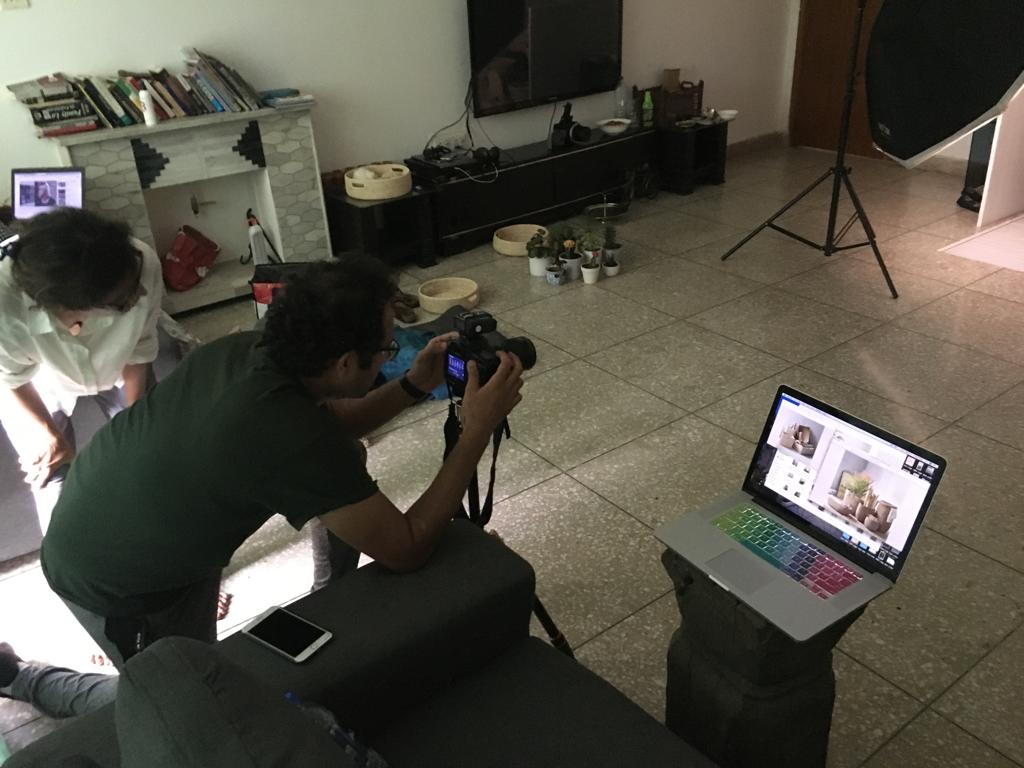
Artisanal traditions that have evolved over thousands of years, taking influence from a vast number of civilisations are a rarity in the world. This is because they can only be found in the earliest spots of settled human civilisation, which includes Sindh. Unfortunately, for most of Pakistan’s history, there has seen little support from the government and private sector for artisanal crafts. This has had a massive impact on the state of Sindhi workmanship. Over the course of the country’s history, millions of artisans — mostly women — have moved onto other trades, mostly agriculture and livestock breeding. The move has failed to bring any improvement in the socioeconomic status of Sindh’s women and girls. In fact, indicators show their economic status has only declined with the collapse of traditional handicrafts.
However, things have begun to change over the past twenty years. Respective governments in both Sindh and the Federal Capital have taken numerous steps to revive Sindhi culture and craftwork. This includes the organisation of festivals, seminars and workshops on traditional workmanship. These efforts have borne fruit, heralding a revival in interest in traditional Sindhi crafts. Furthermore, the province’s women artisans have also begun to emerge as income earners in their communities.
This doesn’t mean the damage done from years of neglect has been completely reversed. Sindh’s artisans are not familiar with practices essential to running their businesses successfully. This includes standardising outputs, practising bookkeeping, using professional tools and basic business skills — especially management. Additionally, female home-based workers, who form the backbone of Sindh’s artisanal workforce, remain burdened by household and familial responsibilities that interfere with their output. Furthermore, the emergence of the coronavirus and the disruption it has caused in Pakistan has made digital literacy more important for running a business than ever before. All of these issues continue to be hurdles in the revival of Sindhi arts and crafts as well as the socio-economic emancipation of the province’s people, especially women.
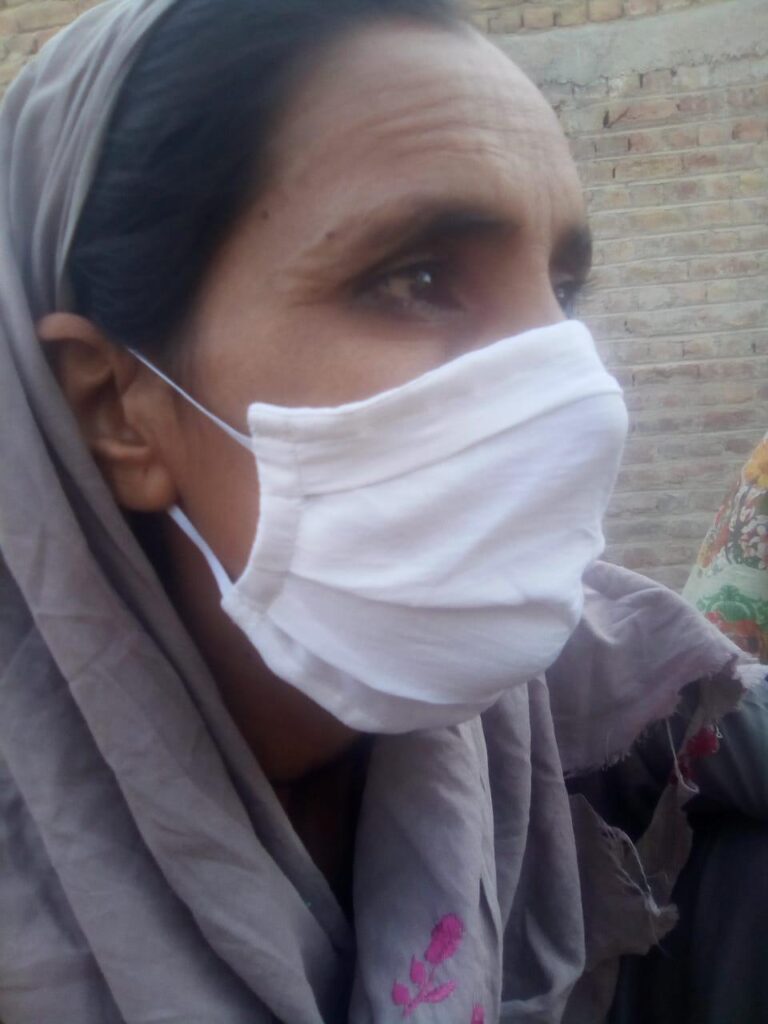
Ever since the coronavirus pandemic reached Pakistan, over 120,000 cases of infection have been recorded in Sindh. This makes it the most affected province in the country. On 23rd March, 2020 the provincial government imposed a lockdown throughout the territory in an effort to contain the virus. Since then, the lockdown has been extended numerous times.
While this move was necessary, it had a severe impact on our Business Development Groups, as family breadwinners found themselves confined to their homes.
Taking this situation into account, we began a relief effort from 29th March. Headed by project lead Zein Ahmed our team distributed rations to 10 BDGs in March and April on three separate occasions. The final one of these was taken to the villages in the final week of Ramzan. About 230 households were provided monthly rations, at their own homes, for a period of 3 months. Serving about 1750 people for a duration of 3 months.
We have also carried a few clothes and shoes drives, books and toys drives for our villages, over the last 3 years.
Our income generation specialist Zein Ahmed has over three decades of experience in ethical design and fashion. She has had a lifelong love of handloom textiles, which inspired her to pursue it as a career. In 1998, Zein moved to New York City. Here, she became part of the #slowfashion movement, setting up her own clothing label: Guru. Advocating for ethical and environment friendly production practices, Zein aimed to fight wasteful practices in the fashion industry. Her work has been featured and appreciated in acclaimed magazines and newspapers such as The Oprah Magazine, The New York Times, The Veranda, and Vogue.
In 2016, she returned to Pakistan where she conducted a market and sales assessment for Sabah Pakistan to understand demand for crafts forms, trained Sabah’s network of home-based workers in better design, and facilitated sales linkages with various outlets. Subsequently, Zein conducted a rapid Project Appraisal of the Enterprise Development Section of Sindh Rural Support Organization (SRSO) to assess its capacity for handicraft development.
Since October 2018, Zein has been working part-time with JICA as a Business Development and Design Specialist focused on developing a business plan and product line for a project that aims at developing a comprehensive package to uplift the livelihoods and well-being of FHBWs and their families. Lovehandmade.co is her brainchild, and is already changing the lives of Sindh’s FHBWs.
https://www.linkedin.com/in/zeinahmed/
Mahnoor is a Karachi based visual artist. She has had a lifelong interest in animation and design, and has been honing these skills from a young age. Mahnoor is a graduate of the Indus Valley School of Art and Architecture, majoring in sculpture and print-making, and began to experiment with merging animation and fine art during her thesis year. Her exploration of these mediums during this time, along with her fondness for videogames inspired her to incorporate elements of Pakistani culture in vintage arcade games.
In 2019, the impressive nature of her work prompted the Pakistani TV network GNN to interview her about her work. Mahnoor’s art has also been displayed at the prestigious Koel Gallery in Karachi.
Mahnoor has played a critical role in the development and conceptualization of Lovehandmade.co from the outset of the project. She designed the organization’s logo ad also set up Lovehandmade.co’s social media accounts.
https://www.linkedin.com/in/mahnoor-qazi/
A journalist by profession, Wasay has five years of experience in print and television journalism. Over the course of his career, he has reported on the state of security, the environment and digital infrastructure in Pakistan. Most notably, he has reported on the 2018 Mubarak Oil Spill, one of the biggest environmental crises on the country’s coastline. He also reported on the October 2018 bank data security breach, the biggest incident of its nature in Pakistan.
In 2020, Wasay decided to expand his career beyond the scope of mass media and joined Team LH as a researcher and report writer. He uses his journalistic skills to document and record daily happenings in our Business Development Groups. This has proven crucial to developing a better understanding of rural Sindh, and the needs of its people.
https://www.linkedin.com/in/wasay-ibrahim-095a7614a/
Input your search keywords and press Enter.